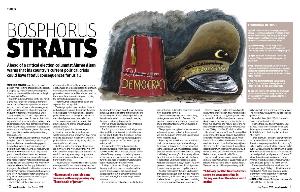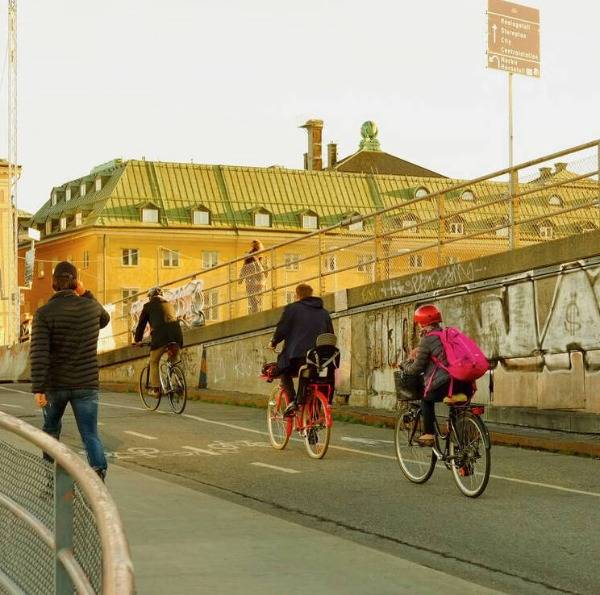Turkey is moving toward a great – and possibly final – settling of accounts. The country is crippled by a fundamental and dangerous divide. Secularists and Islamicists are battling for influence in Asia Minor.

On the other hand, there are those who went to high school at Robert College, with its girls’ lyceum; who have danced at college parties or weddings, who go to movies; who read books, though not a lot; who are relatively well educated; whose taste in music ranges from pop to classical; whose homes are decorated relatively tastefully; whose women don’t cover their heads; who may not permit their teenage girls to date but look the other way when they do; who believe in God but pay little attention to prayers; who drink alcohol in mixed company though they may not know much about wines; who follow newspapers, watch talk shows, feel they are more progressive than the first group and live largely western lives.
The lifestyles of these two groups are disconnected. Unlike in the west, where a sensibility shared by all classes is created out of such elements as church music, religious iconography and stories from the Bible adapted even for the screen, there is no cultural ground uniting the competing groups in Turkey.
Their lives, their tastes and their beliefs are separate. Even antagonistic.The first group has been despised, discredited and pushed around throughout the years of the Republic. Now this group has become politically organised. It is large. And it now has the political power to win every election.
The second group is in the minority. And it currently has no chance of ever winning another election.It is at this point that there emerges a historical paradox: because the more western,second group knows that it will never come to power again if it observes western political ideas, it is becoming antagonistic to western democratic values.
But those in the first group, whose values are inimical to the West, know they will only take power by accepting western criteria. The result is that they are trying to appropriate democratic values and enhance their relations with the west.
The army has an important role in this cultural disintegration. If it supports the first group, and the criteria of western democracy are observed, the army will lose power as well. In fact the army is made up of children of the first group who are cooperating with the second group, inimical to them, in order to hold on to power. In a sense, the army is betraying its own roots.
The two groups now appear to be mobilised for their final battle for power.
The first group is now economically powerful as well. Because its relations with the state are not good, it sells what it produces in Anatolia abroad. It has earning power. It supports its political organisation. The second group lacks capital.
The supporters of the first group are the greater bourgeoisie, which trades abroad and borrows abroad. It is an intellectual sector which believes Turkey can only normalise by means of democracy, and a group of bureaucrats who think the structure of the state must change to better integrate with the wider world.
But important sectors of the justice system, the army and the bureaucracy are behind the second group. Because the second group realises it cannot stay in power by political and democratic means, it is now looking for other solutions.The presidential election has brought the two sides’ intentions out into the open and revealed how sharp their conflict is.
The second group, supported by the army, no longer wants an election. Rumours of a possible coup increase with every passing day. There is talk of juntas. But what will happen if there is a coup?
The group whose style of life is more western will come to power backed by the army and will lose the support of the west; Europe would never support a coup. Ever-pragmatic America, on the other hand, could perhaps accept a putsch in exchange for support of its policies in northern Iraq and in the Middle East. But America faces a serious obstacle. A nation that has occupied Iraq saying it will bring “democracy” to the country will not be able to explain to the world or to itself why it supports an undemocratic coup in Turkey. And after the disaster of Iraq, it doesn’t have the power to sweep aside international objections. It would have to oppose a coup, like it or not.
So what will a country that gets funding from the west, possessing an army that gets weapons from the west, do if it breaks away from the west? I believe the second group has been considering this for some time. And has found an answer.If there is a coup in Turkey, the world would encounter a phenomenon it has never seen before. Subsequent to a coup, Turkey would seek a partnership with Russia and Iran and would obtain its weapons, energy and funding from these two countries. The natural gas, oil and nuclear power from Russia and Iran would suffice to keep Turkey on its feet, if only for a while.
But a block made up of Russia, Turkey and Iran could change the global balance. It would take complete control of the Middle East. It would imprison Europe within the borders of its small continent. It would draw the Caucasus, Afghanistan, and Pakistan under its sway. It would form close relations with the Muslim world. It would dominate the sources of oil. It would also be likely to form a partnership with China.
Such a development would dramatically decrease the effectiveness of a west made up of Europe, America and to a lesser degree, Japan. The new bloc would have great strength militarily, financially and in terms of energy sources. The Turkish fissure would thus lead to one on a global scale.
If there is to be a World War III, I believe it would emerge from this rift.
“Such a thing could never happen,” you may say. Those with incontrovertible data showing why it could not should speak up. But if it did – and I think it quite possible – what then?
To tell the truth, I think this scenario should be considered by all the actors involved: by those forming camps and divisions in today’s Turkey; by the Europe that tries to push Turkey out of Europe, dealing insolently with a nation whose imperial inheritance is at once magnificent and pathetic, and pretends to “instruct” rather than offer cooperation; and by an America which believes itself clever when it plays a double game in its Turkey policy.
A bloody conflict like that which seems to be approaching in Turkey could set the whole world on fire. And it is not as distant as one might think. Never forget that World War I began with a single gunshot.
Ahmet Altan is one of Turkey’s most successful writers. He lives in Istanbul

